(TheNewswire)
Vancouver, BC - TheNewswire - February 14, 2023 - VR Resources Ltd. (TSXV:VRR) (FSE:5VR)(OTC:VRRCF), the "Company", or “VR”, is pleased to report on the first phase of the mineralogy and metallurgy study of the REE critical metal mineralization at its Hecla-Kilmer (“H-K”) project in northern Ontario.
Highlights
-
Scanning electron microprobe (SEM) confirms PMREO(2) minerals hosted in
monazite and parisite, phosphate and fluorocarbonate minerals, respectively.
-
The REE mineralogy is consistent. It does not change through the 461 m vertical intersection of continuous mineralization starting at surface at Pike Zone, and it is the same 2.5 km away at the South Rim Zone.
-
Monazite has proven REE extraction, and it is the focus of new REE facilities in Canada.
Context for New Data
REE critical metal mineralization was discovered at Hecla-Kilmer in the first reconnaissance drill program completed by VR in 2020. The 21 holes completed to date are shown in Figure 1.
The new mineralogy data reported herein are from an electron microprobe (EMPA) equipped with an Energy Dispersive Spectrometer (EDS). The work was completed by Renaud Geological Consulting Ltd. (RGC) based in London, Ontario, who have extensive experience on REE deposits in Canada. The six samples submitted for this study were designed to span the 500 metres of vertical extent of REE mineralization at Pike Zone, and mineralization 2.5 km away at the South Rim Zone.
CEO Comment and Drill Core Photos
From VR’s CEO, Dr. Michael Gunning, “I simply cannot understate the significance of these results towards the advancement of this REE critical metal discovery at Hecla-Kilmer.
First, these new SEM results are entirely consistent with results we have obtained from all of the state-of-the-art technologies we have been able to utilize from the very beginning of our exploration to better understand the REE mineralization. Suffice it to say, the new data on monazite are not surprising:
-
QEMSCAN analyses in 2020 by SGS Canada, Lakefield, which determined the styles of mineralization and alteration, and confirmed the role of monazite and apatite, a phosphate mineral, for hosting PMREO: Figure 2
-
Whole-core XRF scanning on site in 2021 by GeologicAI of Calgary, which improved real-time decision making for drilling, and confirmed the correlation between TREO and P: Figure 3
-
Lithium-borate fusion to optimize REE detection in drill core geochemical samples: Figure 4;
-
Electron microprobeanalyses (EMPA-EDS) in 2023 by RGC in London and reported in this news release to confirm monazite and parisite as the host minerals for the individual Permanent Magnet REO’s, both in apatite veins and in carbonatite breccia cement: Figure 5, Figure 6
This mineralogy is important. Canada is plagued with REE discoveries made during the past 60 years that have never been developed because of the difficulty in extracting and recovering REEs contained in silicate and/or refractory minerals. REE beneficiation from the sulfate mineral monazite is proven however, so the two new REE processing facilities that have been recently built in Saskatoon and in Utah in order to bolster domestic raw material supply for the EV industry in North America are both designed around REE concentrates with monazite mineralogy. As such, it is a significant milestone for the Hecla-Kilmer project that the new EMPA-EDS data confirm that the Permanent Magnet REO minerals are hosted in monazite and parisite.
Finally, the importance of the high proportion of the four PMREOs in REE mineralization at Hecla-Kilmer is worth re-emphasizing. This ratio is important because of the high price of the PMREOs, such as neodymium and terbium, in response to the demand for permanent magnets in electric vehicles and wind turbines. For comparison, published resources for most Canadian LREE deposits in carbonatite typically contain between 12-15% PMREO of TREO, which is roughly 40% lower than the 19-22% proportion at H-K. The graphic below enforces what that means for the value potential of this discovery.
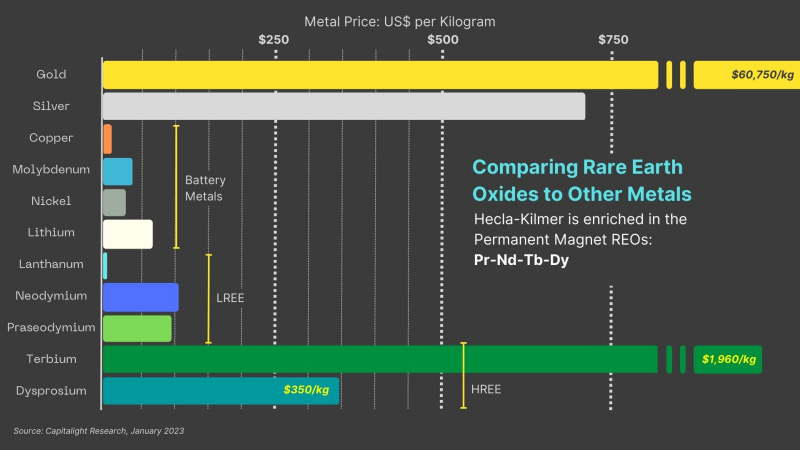
Click Image To View Full Size
Next Steps Planned for the Hecla-Kilmer Project in 2023:
For Phase 2 of our beneficiation study of the REE mineralization at H-K, VR has completed the scoping for a full metallurgy and mineral extraction study using a bulk sample obtained from drill core spanning a broad intersection of REE mineralization starting at surface at the Pike Zone. This work is planned for the first half of 2023, utilizing the recognized REE expertise at SGS Canada laboratories in Lakefield, Ontario, and building upon our work with SGS for the past two years.
Follow-up drilling is planned for the spring of 2023. It will focus on supporting the afore-mentioned advanced-stage studies at the Pike Zone, in addition to completing additional exploration drill holes targeting other areas of known mineralization discovered to-date.
Overall, the path forward for this emerging discovery is strengthened by its location, just 23 km to the northwest of the provincial hydroelectric dam at Otter Rapids, with supporting and active Ontario Northern railroad and Highway 634 infrastructure.
Technical Information
Summary technical and geological information for the Company’s various exploration properties is available at the Company’s website at www.vrr.ca.
VR submits sawn drill core samples for geochemical assay to the ALS Global Ltd. (“ALS”) laboratory facilities in Timmins or Thunder Bay, Ontario, with final geochemical analytical work done at the ALS laboratory located in North Vancouver, BC., including lithium borate fusion, ICP-MS and ICP-AES analyses for base metals, trace elements and full-suite REE analysis, and gold determination by atomic absorption on fire assay. Analytical results are subject to industry-standard and NI 43-101 compliant QAQC sample procedures, including the systematic insertion of sample duplicates, blanks and certified reference material (CRM) done both externally by the Company on the exploration site, and internally at the ALS laboratory.
Technical information for this news release has been prepared in accordance with the Canadian regulatory requirements set out in National Instrument 43-101. Justin Daley, P.Geo., VP Exploration and a non-independent Qualified Person oversees all aspects of the Company’s mineral exploration projects, and the content of this news release has been reviewed on behalf of the Company by the CEO, Dr. Michael Gunning, P.Geo., a non-independent Qualified Person.
-
TREO is the summation of Ce2O3 + La2O3 + Pr2O3 + Nd2O3 + Sm2O3 + Eu2O3 + Gd2O3 + Tb2O3 + Dy2O3 + Ho2O3 + Er2O3 + Tm2O3 + Yb2O3 + Lu2O3 + Y2O3.
-
PMREO is the sum of high value rare earth oxides used in permanent magnet motors and turbines used in electric vehicles and wind turbines (Pr2O3 + Nd203 + Tb2O3 + Dy2O3).
About the Hecla-Kilmer Property
The Hecla-Kilmer complex is located 23 km northwest of the Ontario hydro-electric facility at Otter Rapids, the Ontario Northland Railway, and the northern terminus of Highway 634 which links the region to the towns of Cochrane and Kapuskasing to the south, itself located on the northern Trans-Canada Highway.
The H-K property is large. It consists of 224 mineral claims in one contiguous block approximately 6 x 7 km in size and covering 4,617 hectares. The property is owned 100% by VR. There are no underlying, annual lease payments on the property, nor are there any joint venture or back-in interests. Hecla-Kilmer is located on provincial crown land, with mineral rights administered by the Ontario Ministry of Northern Development, Mines, Natural Resources and Forestry (“MNDM”). There are no annual payments, but the MNDM requires certain annual exploration expenditures and reporting. The property falls within the traditional territories of the Moose Cree and Taykwa Tagamou First Nations.
About VR Resources
VR is an established junior exploration company focused on greenfield opportunities in critical metals, copper and gold (TSX.V: VRR; Frankfurt: 5VR; OTCQB: VRRCF). VR is the continuance of 4 years of active exploration in Nevada by a Vancouver-based private company. The foundation of VR is the diverse experience and proven track record of its Board in early-stage exploration, discovery and M&A. The Company is well-financed for its exploration strategies and corporate obligations, and focuses on underexplored, large-footprint mineral systems in the western United States and Canada. VR owns its properties outright and evaluates new opportunities on an ongoing basis, by staking or acquisition.
ON BEHALF OF THE BOARD OF DIRECTORS:
“Michael H. Gunning”
____________________________
Dr. Michael H. Gunning, PhD, PGeo
President & CEO
For general information please use the following:
Website: www.vrr.ca
Email: info@vrr.ca
Phone: 778-731-9292
Forward Looking Statements
This press release contains forward-looking statements. Forward-looking statements are typically identified by words such as: believe, expect, anticipate, intend, estimate, postulate and similar expressions or those which, by their nature, refer to future events. Forward-looking statements in this release includethose related to the company’s upcoming plans, such as “Follow-up drilling is planned for the spring of 2023”, and “VR evaluates new opportunities on an ongoing basis.”
This news release contains statements and/or information with respect to mineral properties and/or deposits which are adjacent to and/or potentially similar to the Company’s mineral properties, but which the Company has no interest in nor rights to explore. Readers are cautioned that mineral deposits on similar properties are not necessarily indicative of mineral deposits on the Company’s properties.
Although the Company believes that the use of such statements is reasonable, there can be no assurance that such statements will prove to be accurate, and actual results and future events could differ materially from those anticipated in such statements. The Company cautions investors that any forward-looking statements by the Company are not guarantees of future performance, and that actual results may differ materially from those in forward-looking statements. Trading in the securities of the Company should be considered highly speculative. All of the Company’s public disclosure filings may be accessed via www.sedar.com and readers are urged to review these materials.
Neither the TSX Venture Exchange nor its Regulation Services Provider (as that term is defined in Policies of the TSX Venture Exchange) accepts responsibility for the adequacy or accuracy of this release.

Click Image To View Full Size
Figure 1. Locations and key REE intersections for the 21 drill holes completed to date at Hecla-Kilmer, plotted on a contoured RTP magnetic base map with superimposed 3D iso-shells from the MVI inversion. The new SEM mineral data reported herein are from Hole 13 at the Pike Zone, and Hole 15 at the South Rim Zone.
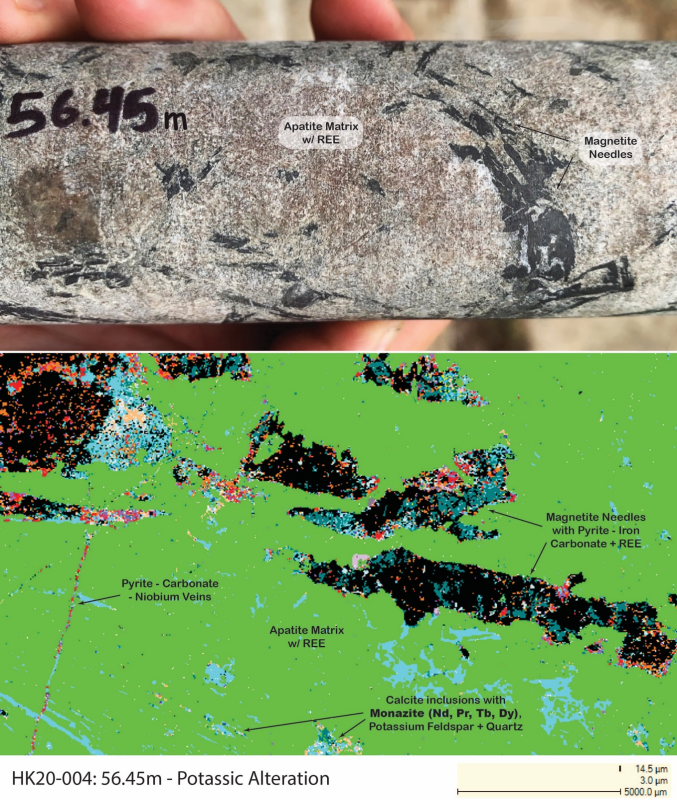
Click Image To View Full Size
Figure 2. Drill core photograph above QEMSCAN imagery and element data from SGS Lakefield Research below, from bedrock surface at the top of Drill Hole HK20-004, showing the relationship between REE minerals and apatite, a phosphate mineral. Calcite inclusions in the apatite vein matrix contain REE-bearing monazite ((Nd,Pr,Dy,Tb)PO4) and parisite, and occur near altered magnetite needles with reaction rims of pyrite–iron carbonate (LREE)–pyrochlore (Na,Ca)2Nb2O6(OH,F). See Figure 1 for Hole 004 location, at the same collar as Hole 13 with 361 m @ 1% TREO.
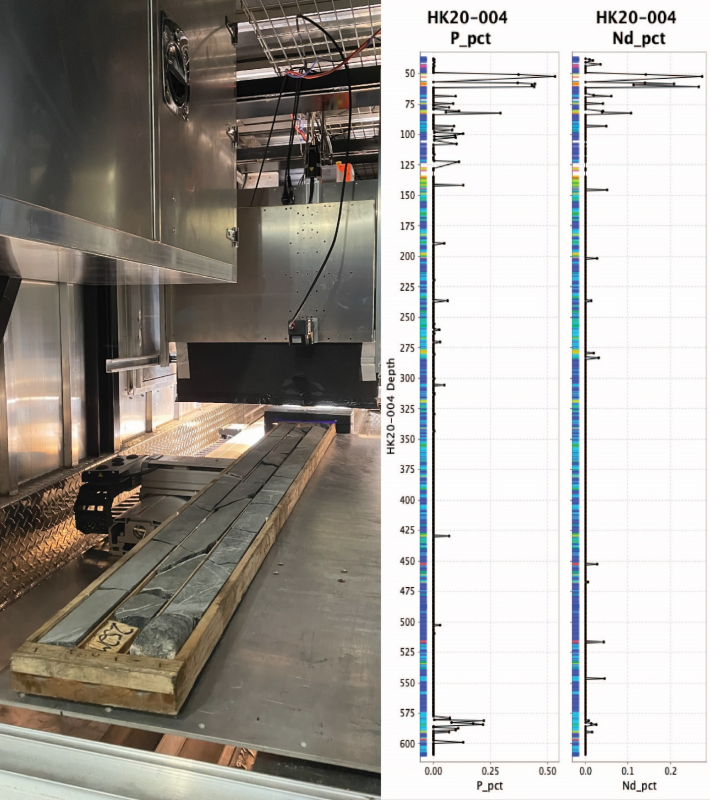
Click Image To View Full Size
Figure 3. Whole-core XRF and SWIR scanning on-site at the exploration drill camp at Otter Rapids in 2021, using technology by GeologicAI, Calgary. The scanning improved real-time decision making for drilling using down-hole geochemical and mineralogical plots generated in the field, such as the graphic log shown on the right. The correlation between TREO and P2O5 evident in the REE mineralization at surface in Drill Hole 004 is consistent with the correlation evident in drill core geochemical data shown in Figure 4. This correlation is also consistent with the apatite-monazite phosphate mineralogy for the PMREOs at Hecla-Kilmer as identified by both QEMSCAN (Figure 2) and SEM (Figures 5 & 6).
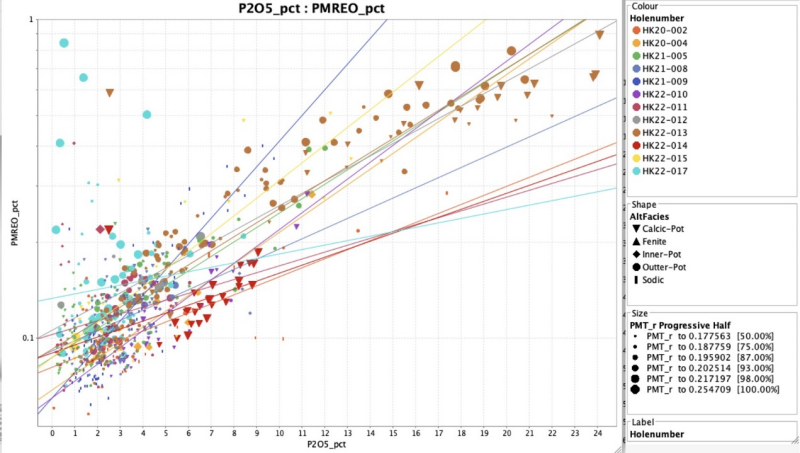
Click Image To View Full Size
Figure 4. Geochemical plot of P2O5 vs. PMREO (the permanent magnet REOs) based on a robust data set derived from approximately 4,600 samples from the first 17 drill holes completed at Hecla-Kilmer. The correlation coefficient is nearly 1:1, and it reinforces the same correlation evident in XRF data for Hole 004 as shown in Figure 3. This correlation is consistent with the apatite-monazite phosphate mineralogy for the PMREOs at Hecla-Kilmer as identified by both QEMSCAN (Figure 2) and the SEM (Figures 5 & 6).
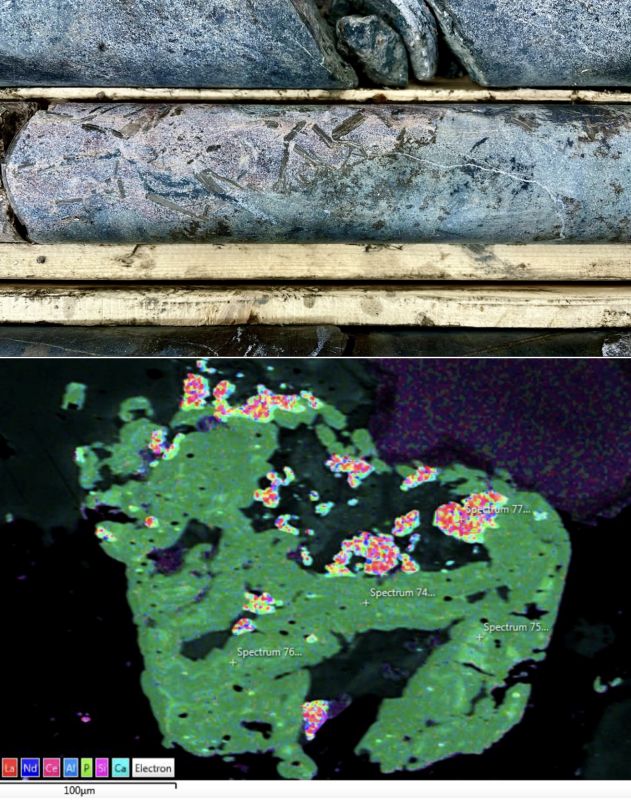
Click Image To View Full Size
Figure 5. Upper: photograph of drill core at 173m depth with 2.8% TREO in drill hole HK22-013 from the Pike Zone at Hecla-Kilmer. The pink and green areas are high temperature, potassic alteration which displays elongate, quenched magnetite and biotite crystals in a matrix of fluorapatite and carbonate. Lower: scanning electron microprobe image at 175m depth in HK22-013 of a zoned apatite crystal; the areas of blue, pink and red pixels are REE-bearing monazite inclusions with Nd, Pr, Tb and Dy. The monazite occurs both as inclusions within apatite in veins, and in the carbonatite vein breccia cement.
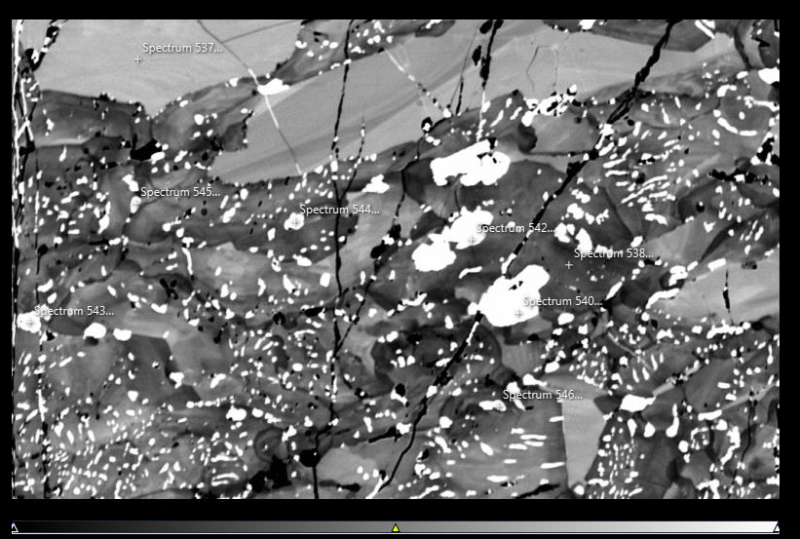
Click Image To View Full Size
Figure 6. Backscatter electron microprobe image from 111m depth in Hole 15 at the South Rim Zone. The abundant areas of bright white reflectance are inclusions of REE-bearing monazite, parisite and britholite within larger, zoned crystals of apatite. This style of REE mineralization, with Nd, Pr, Tb and Dy contained in monazite and parisite as both inclusions within apatite and as isolated crystals in carbonatite breccia cement is consistent across Hecla-Kilmer, from the South Rim to the Pike Zone located 2.5 km to the north (Figure 5).
Copyright (c) 2023 TheNewswire - All rights reserved.